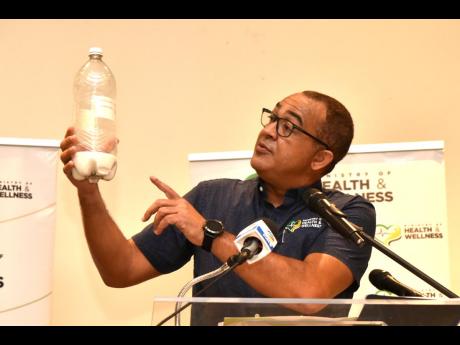Tufton: No sanctions for schools selling high-sugar beverages
Despite a survey of 35 schools by the health and education ministries finding that most were non-compliant with the interim guidelines for beverages in schools, Health and Wellness Minister Dr Christopher Tufton said no action would be taken against the administrators and the Government will not ban drinks exceeding the limit.
The results mirror findings by The Sunday Gleaner, which found beverages with their sugar content exceeding the recommended limit at 16 schools and four health facilities across the island in late April.
Speaking at a joint ministerial press briefing on Wednesday, Health and Wellness Minister Dr Christopher Tufton said that compliance rates were higher prior to the coronavirus pandemic.
“COVID was a great disruptor of many things, and so on the reintroduction of classes, we did a quick examination, a rapid assessment and the compliance at that point was low,” he said, noting that less than 10 per cent of schools – only two canteens – inspected over three days in April were compliant.
Six canteens offered no beverage that was verifiably compliant, but offered beverages in excess of the sugar limit.
Tufton said that schools that were found in breach would not face any sanctions and that the Government would not institute a ban on certain drinks.
“It’s not everything that you can legislate. Sometimes you have to appeal to people’s moral compass,” he said, adding that well-thinking corporate entities should see the reformulating of these drinks for the nation’s children as a social responsibility.
“It is a difficult time to be a child in Jamaica,” he added, noting that premature illness was on the rise.
Tufton noted that one reason behind the non-compliance was that the manufacturers needed to recover losses realised during the two years for which classes were held online.
“For example, I have heard that the cafeteria needs to make money and the children won’t buy less sugar; they want more sugar. That’s not leadership,” he said, noting that this was a minority view.
Tufton stated that this should be countered by taking into consideration “the universal principle that the health and wellness of our children are paramount and should supersede any other reason”.
The minister said only three manufacturers have indicated that they are willing to reformulate beverages to comply with the guidelines in reducing sugar content for beverages sold to students.
Other reasons for non-compliance included difficulty in sourcing compliant beverages and lack of buy-in from staff, vendors and parents.
SPORTS DRINKS
Some 224 beverages were evaluated in the survey, with the most commonly available categorised as ‘drink’ – fruit- or vegetable-flavoured had contained less than five per cent juice.
Only unsweetened coconut water was found to contain 100 per cent juice.
‘Juice drink’ was the second most popular, with unflavoured water the next most common beverage sold.
Three of six schools categorised as ‘Other’ offered sports drinks and lightly carbonated, non-alcoholic malt beverages.
The health ministry also raised concern over the fact that some beverages, including seven different brands of bag juice, could not be evaluated as they did not have a nutrition facts panel.
Compliant beverages – that is, beverages without any added sugar or other kinds of sweetener whether artificial or natural – that have been cleared to be sold in schools include water, coconut water, 100 per cent juice, plain milk and plain soy milk.
In January 2019, when implemented, the sugar limit was six grams per 100 millilitres. This figure has been adjusted to four grams per 100 millilitres. It is the goal of the campaign to move that restriction to 2.5 grams per 100 millilitres come January 2023.
The Jamaica Health and Lifestyle Survey III, 2016-17 noted that the prevalence of diabetes in the island had increased by 41.1 per cent from 2001 to 2017 among Jamaicans 15 to 74 years old. Approximately 11.9 per cent – or 236,200 of Jamaicans 15 years and older – have diabetes .
In driving home the point about sugar consumption, Tufton showed a two-litre beverage, which reportedly had 52 teaspoons of sugar.
“I have taken a keen interest in looking even at the flavoured waters that are available in the stores and I saw where even the flavoured water is, to my mind, the term ‘water’ is a camouflage for an attempt at sugar addiction,” he said, adding that manufacturers are adding up to 35 grams per 100 millilitres.

